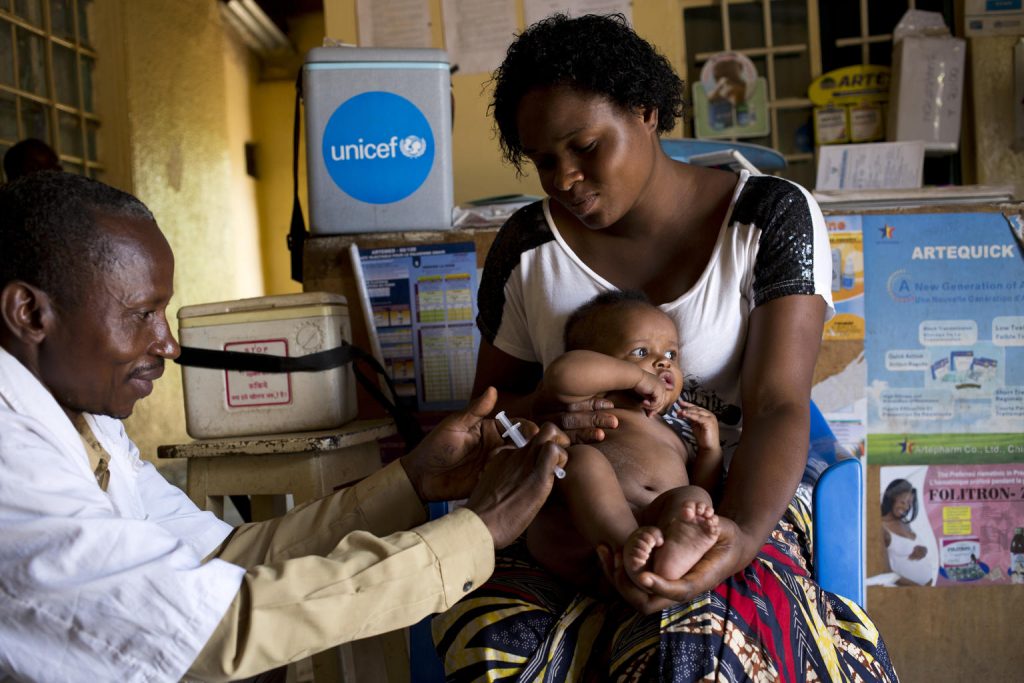PRESS RELEASE
4,500 children under five have died from measles in the Democratic Republic of the Congo so far this year – UNICEF
Measles has caused more than twice as many deaths as Ebola
UNICEF Ireland Executive Director Peter Power is available for interview

DUBLIN/KINSHASA, 27 November 2019 – Since the beginning of the year, more than 5,000 people have died due to measles in the Democratic Republic of Congo, over 90 per cent of them children under the age of five.
While the Ebola outbreak, which has claimed more than 2,000 lives in the Eastern DRC, has commanded sustained international attention, measles, which has claimed more than twice as many lives, continues to be underreported.
Efforts to tackle both measles and Ebola in the DRC are hindered by continuing instability, particularly in the Eastern region of country. Indeed, recent days have seen an increase in violence around the city of Beni, an Ebola hotspot. While UNICEF teams are continuing to support the Ebola response, UNICEF Executive Director Henrietta Fore has expressed concern about the impact on children.
“I’m very alarmed by the recent violence in Beni, DRC, and the impact it will have on the health and well-being of children. I visited the area earlier this year and saw first-hand the difference aid workers can make, working closely with the local community. UNICEF has kept a small team in Beni to support the Ebola response. We’re monitoring the situation closely and hope things return to normal as soon as possible.”
Speaking about the wider effort to tackle measles in the DRC, UNICEF Representative in the DRC Edouard Beigbeder described a number of interlinked challenges. “Violence and insecurity, lack of access to healthcare and shortages of vaccines and medical kits in the worst-affected areas have meant that thousands of children have missed out on vaccinations, with potentially deadly consequences. Cultural beliefs and traditional healthcare practices also often get in the way of vaccinating children against measles and treating those with symptoms.
“Despite the many challenges, we have the tools and the knowledge to prevent measles with a safe, effective and affordable vaccine. The key is to reach every single child, no matter where they are.
UNICEF and partners are conducting measles vaccination campaigns in the worst-affected areas, and supplying clinics with medicine to treat symptoms. UNICEF has distributed 1,317 medical measles kits – containing antibiotics, rehydration salts, Vitamin A and other medicines – to affected health zones to treat children with complications.
Mr Beigbeder described the organisation’s measures as ‘a short-term solution’ and highlighted the importance of immunisation programmes: “Significant investment in strengthening DRC’s national vaccination programme and wider health care systems is crucial to guarantee the health and wellbeing of the country’s children.”
###
Notes for editors:
Multimedia materials available here
Find out more about UNICEF’s work for children in the DRC here: https://www.unicef.org/drcongo/en
About UNICEF
UNICEF works in some of the world’s toughest places, to reach the world’s most disadvantaged children. Across 190 countries and territories, we work for every child, everywhere, to build a better world for everyone.
Follow UNICEF on Twitter and Facebook
For more information, please contact:
Danny Smits, UNICEF Ireland, danny@unicef.ie, +353 87 1308070




